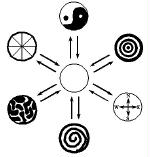|
|
Effective and full performance |
|
A Releasing Your Unlimited Creativity discussion topic | |
|
Copyright 2008 by K. Ferlic, † All Rights Reserved | |
| RYUC Home Why free? Contact Links Programs Services Contributions | |
|
It is probably an accurate statement to say effective and full performance is the desire of any organization. However, the question that is not often consider is, "What is effective and full performance?" Most believe that they know . But then we must ask, "Is what an individual believes as to what effective performance is and what full performance is reflective of the truth of what is possible in a given situation?" Here lies some interesting issues. In general, effective performance is seen as performance that meets expectations. Meeting expectations says nothing about how those expectations are met and at what cost. Similarly, the expectation we have that we effectively meet do not necessary reflect the expectations we should have to meet the organizational objective. That is, what we think are good measures of performance my in fact be hurting us in the long run. Full performance is often seen as synonymous with effective performance. That is, the performance of an individual or organization fully meets expectations. Hence we have full performance. However, such a definition and understanding of full performance says nothing about whether or not the individual is performing fully and whether the organization as a whole is performing fully. It is not uncommon to have individuals under utilized or have overly qualified individuals. Also, it is not uncommon to over tax anyone individual seeking to get them to perform fully only to so scatter and fragment their attention that performance becomes marginal. It is here we need to take look at our expectation top see if they really are adequate and we need to look at how we think we need to measure performance. Here is a quote a from one manager to another relative to understanding and developing proper expectations. "Your office requests that metrics be developed and used against field office personal. It is suggested consideration be given to the following fact. Although generic metrics could be given, experiences within my office have shown that effective metrics cannot be developed until one explores the exact weak links in the organizational system. One of the biggest mistakes organizations make is to employ metric, and then be held accountable to metrics, that do not quite fit their structure and mission. In time, issues tend to only be compounded with such an approach. The my organization has yet to recover from such mistakes in some areas of performance." From the organizational creativity perspective, effective performance is when objectives and organizational needs are met in an efficient manner across all aspects. That is, there is effective use of time, money and resources and the individualís creative spirit is nourished or there is an appropriate balance to have the creative spirit nourished. Full performance is seen as using all capabilities available to about an seventy five or eighty percent level. One does not want to run the whole operation at one hundred percent. If one does there will not be any reserve capacity to meet the unexpected. For example if someone gets sick, there will be no reserve to fill in or someone to pick up the slack. The same is true individually. Running at one hundred percent capacity leave no room for the unexpected. Where as, running about eighty percent load allows one to become diverted for whatever reason and yet be able to maintain performance. The thought of designing an organization to run at eighty percent full capacity may seem like a poor use of resources. However, if one looks at all the unexpected issues which arises in any organization, that margin of twenty percent will quickly be consumed by the unexpected. In looking at effective and full performance, the following provide some thoughts for consideration in developing our expectations for which we will desire effective and full performance individually for our selves or others and our organization. What is it we really wish to accomplish with our expectation? Pull the string as to why we think we need to accomplish what we do. In observing what we find in pulling the string, is what we find and what we are trying to accomplish really helping to meet personal and/or organizational goals and objectives. Are our expectation really aligned with meeting organizational goals? Are we placing expectations on how we meet the expectation and is the "how" diverting us from more efficient and/or cost effective ways of meeting the objective? Do our expectations both allow us to meet a desired goal and nurture the creative passion of the individual to carry the organization forward or do we kill the very spirit we need for safe and quality performance? Do our rewards really help us to meet effective and full performance both short term and long term? When we speak of full performance do we look at fully meeting a particular expectation or do we look at fully utilizing the resources we have. In looking full and effective performance, is our training and/or qualification programs helping to achieve effective and poor performance or are the creating a minimum level of performance? Do the effective and full performance expectations as good as they may be become ends in themselves diverting attention away from the true needs of the organization? Related topics The Password Protected Area provides access to all currently posted (click for current loading) Releasing Your Unlimited Creativity related discussion files and applications. |
|
|
RYUC Home Why free? Contact Links Programs Services Contributions | |
